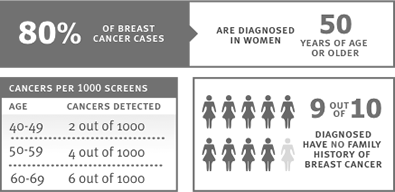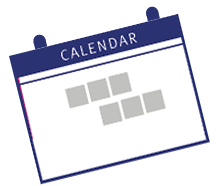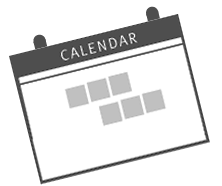If you are between the ages of <%= cohortMin %> without a family history of breast cancer, you are encouraged to talk to your doctor about the benefits and limitations of screening mammography. If screening is chosen, it is available every two years. A doctor's referral is not needed but is recommended.
If you are between the ages of <%= cohortMin %> without a family history of breast cancer, it is recommended that you get a mammogram every two years. A doctor's referral is not needed.
If you are between the ages of 40-74 with a family history of breast cancer, it is recommended that you get a mammogram every year. A doctor's referral is not needed.
A family history of breast cancer is one first degree relative (mother, sister, or daughter) with breast cancer.
Possible Outcomes of Your Next Mammogram
Based upon the information that you entered, the following statistics indicate your likelihood of various outcomes for your next screening.* We recommend taking this information to your doctor to assist you in deciding if screening is right for you.
Your likelihood of having a breast cancer found is
<%= percentage %>%
That means <%= permillage %> out of 1000 women screened with a history similar to yours would have a breast cancer detected at their next screening mammogram. Mammograms help find cancer in its earliest stages – when there is a better chance for successful treatment.
For comparison, on average every year in BC, <%= summaryPermillage %> out of 1000 women ages <%= cohortLabel %> screened will have a breast cancer detected.
Your likelihood of having a false alarm is
<%= percentage %>%
That means <%= permillage %> out of 1000 women screened with a history similar to yours would be called back for further testing which will turn out to be normal.
For comparison, on average every year in BC, <%= summaryPermillage %> out of 1000 women ages <%= cohortLabel %> screened will have a false alarm.
Your likelihood of having a biopsy false alarm is
<%= percentage %>%
That means <%= permillage %> out of 1000 women screened with a history similar to yours would need a biopsy which will turn out to be normal after testing.
For comparison, on average every year in BC, <%= summaryPermillage %> out of 1000 women age <%= cohortLabel %> have a biopsy which will turn out to be normal.
Make an Informed Decision About Screening Mammography
Know the benefits…
Mammograms save lives
Mammograms help find cancer when it is small, allowing more treatment options.
Mammograms are effective

Research has shown a 25 per cent reduction in deaths from breast cancer among women who are screened regularly.
Your breast cancer risk increases with age

…and understand the limitations.
Mammograms are not perfect
Not all breasts look the same on a mammogram — a woman's age or breast density can make cancers more or less difficult to see. In general, screening mammograms are less effective in women under 50 because they tend to have denser breast tissue.
Mammograms may lead to additional testing
On average, 7 per cent of women screened will require additional testing to look more closely at a specific area of the breast. This does not mean that a cancer was found — over 95 per cent of the women recalled for additional testing do not have cancer.
Mammograms do not detect all cancers
Some cancers cannot be detected on a mammogram due to the location of the cancer or the density of the breast tissue. About 25 per cent of cancers in women age 40-49 are not detectable by a screening mammogram, compared with about 10 per cent in women older than 50.
Women who notice any changes in their breasts should consult with their doctor.
*The statistics for this report are based on BC data and may not accurately reflect results for women who screen outside of BC. These results are general estimates and should only be used as a framework to facilitate discussion between a woman and her health professional. Women who notice any changes in their breasts should consult with their doctor.



 To book a mammogram, call 1-800-663-9203. The booking clerk will ask for the name of your doctor and your BC Services Card/CareCard.
To book a mammogram, call 1-800-663-9203. The booking clerk will ask for the name of your doctor and your BC Services Card/CareCard.



